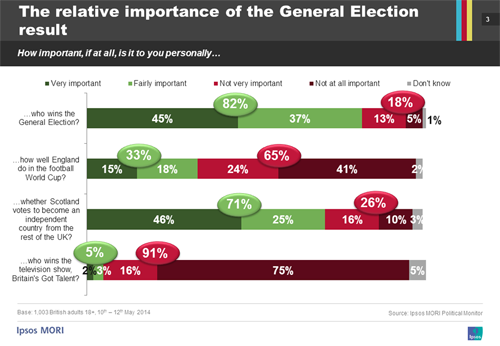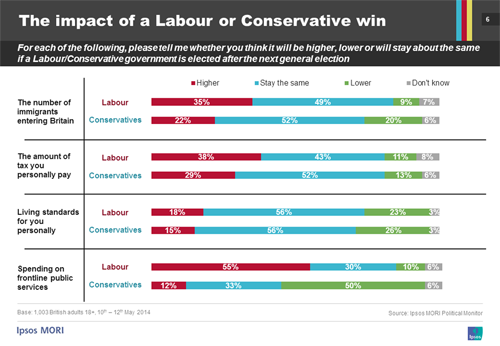General Election 2015: One Year Out
In new research carried out by Ipsos and King's College London, just under half of Britons (45%) say it is very important to them who wins the election, matching figures normally seen at the very height of the election campaign itself in 2010 and 2005.
Importance of general election result to public reaching levels normally seen at height of campaign – and far more important than England’s World Cup fortunes
 In new research carried out by Ipsos and King’s College London, just under half of Britons (45%) say it is very important to them who wins the election, matching figures normally seen at the very height of the election campaign itself in 2010 and 2005. Indeed, only six months before the last election in November 2009, just 35% said the election result was very important to them.
In new research carried out by Ipsos and King’s College London, just under half of Britons (45%) say it is very important to them who wins the election, matching figures normally seen at the very height of the election campaign itself in 2010 and 2005. Indeed, only six months before the last election in November 2009, just 35% said the election result was very important to them.

The election though holds less importance for young people, with just a third (35%) of 18-34s finding who wins the next general election very important, compared with 44% of 35-54s and 53% of those aged 55+. Liberal Democrats also say the election result is less important to them; just a quarter (24%) of Liberal Democrats find it very important who wins, compared with 51% of UKIP and Conservative supporters and 57% of Labour supporters. Despite saying the election result is important to them, only a quarter (23%) think it will make a big difference to their lives personally who wins the next general election, however. Four in ten (42%) say it will make ‘some’ difference to them, and another third (33%) little or no difference. Further, on three key measures to the public (immigration, taxation and living standards), many think that there will be little change under either a Labour or Conservative government. Around half of the public think the number of immigrants (52%), the amount of tax they pay (52%) and their living standards (56%) would stay the same under a Conservative government, with similar figures for Labour (49% for immigrants, 43% for tax and 56% for living standards).
 However, the Conservatives do still have an advantage on tax and immigration, while Labour’s lead on improving living standards is only marginal. Just over a third (35%) think there would be more immigrants under a Labour government, compared with 22% under the Conservatives, and four in ten (38%) think the amount of tax they pay would rise under Labour, compared with 29% who think tax would rise under the Conservatives. On the other hand, 18% think their standard of living would rise under Labour, compared with 15% who think it would rise under a Conservative government. Labour are seen as substantially more likely to raise spending on frontline public services, with 55% expecting a rise under their governance, while the Conservatives are seen by 50% as likely to lower expenditure were they to win power.
However, the Conservatives do still have an advantage on tax and immigration, while Labour’s lead on improving living standards is only marginal. Just over a third (35%) think there would be more immigrants under a Labour government, compared with 22% under the Conservatives, and four in ten (38%) think the amount of tax they pay would rise under Labour, compared with 29% who think tax would rise under the Conservatives. On the other hand, 18% think their standard of living would rise under Labour, compared with 15% who think it would rise under a Conservative government. Labour are seen as substantially more likely to raise spending on frontline public services, with 55% expecting a rise under their governance, while the Conservatives are seen by 50% as likely to lower expenditure were they to win power.
As may be expected, findings are biased by voting intention, with Conservatives more likely to think their taxes and immigration would be higher and standards of living lower under Labour, with Labour supporters more likely to believe the opposite. Spending on public services is an exception to this, with Labour and Conservative supporters both more likely to think it will rise under a Labour government and fall under a Conservative one. UKIP supporters, meanwhile, are more likely to think immigration and taxation will increase rather than decrease under Labour and the Conservatives.
“It seems we have an exciting – and unpredictable – year ahead to the general election in May 2015, and the result is already as important to the public as we normally see at the height of an election campaign. At the same time though, both the main parties have a challenge to convince the public that they really can make a difference to their day-to-day lives, whether that is on taxation, immigration or living standards.”
Technical note: Ipsos interviewed a representative sample of 1,003 adults aged 18+ across Great Britain. Interviews were conducted by telephone 10th – 12th May 2014. Data are weighted to match the profile of the population.
- These results and more will be discussed at a joint Ipsos and King’s College London event on Tuesday 27th May - General Election: One Year Out.
- More details and to register
More insights about Public Sector



